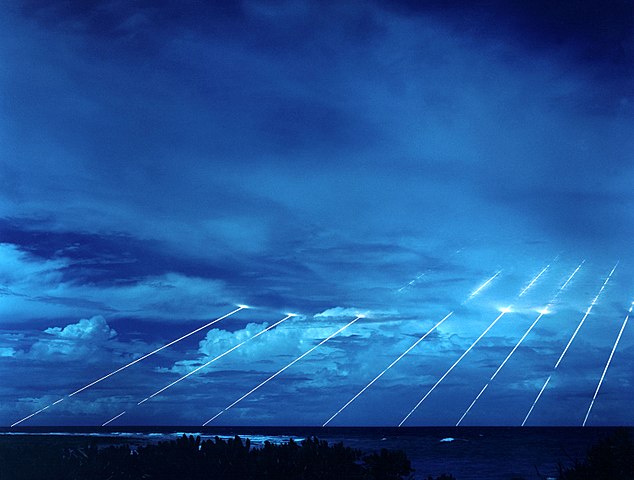The US Nuclear Posture Review: projections from a ‘pre-decisional’ draft
Posted By Rod Lyon on January 15, 2018 @ 14:30

Late last week, a ‘pre-decisional’ draft [1] of the Trump administration’s forthcoming Nuclear Posture Review (NPR) was leaked to the Huffington Post. While it would be wrong to treat that draft as the final text—after all, that’s what pre-decisional means—I’d venture the following projections based on the dominant themes in the leaked copy.
First, this NPR will bring to a close a period of recent history when US nuclear policy turned on a belief that Washington’s own restraint would induce others to follow in the same direction. Instead, we’ll see a return to US nuclear activism, driven in part by a bedrock truth: nuclear weapons are going to be around for the long term. Closely related to that, the period in which Washington flirted with the idea that nuclear weapons might soon have a sole purpose—deterring others’ use of nuclear weapons—has also ended. US nuclear clout will increasingly be brought to bear against a wider range of strategic threats—not because the threshold is being lowered, but because a greater range of threats can now cross the threshold.
Second, the 2018 NPR will be powerfully shaped by a deteriorating strategic environment, just as the Obama administration’s 2010 NPR was similarly shaped by an improving one. Russian, Chinese and North Korean behaviour over recent years means that the new NPR must re-emphasise the traditional roles of deterrence and assurance that US nuclear weapons usually play in global and regional relations. Moreover, great-power relations have already settled into a renewed contest in swaggering, to which the US cannot feign indifference.
Third, and of direct relevance to US allies such as Australia, the NPR will mark a determined US effort to re-energise extended nuclear deterrence. The best indicator of that is the language used in the leaked copy. The term ‘extended nuclear deterrence’ never appears in Obama’s NPR; instead we got ‘extended deterrence’, the second adjective having been surreptitiously smuggled away. The forthcoming NPR returns the adjective to its rightful place—and makes plain that US allies seek nuclear assurance in more disquieting times. Allied capitals should expect franker discussions with Washington about improving the nuclear umbrellas in their neighbourhoods.
Fourth, Trump’s NPR will likely mark the return of the US navy to the extended nuclear deterrence mission. The idea of fitting a small number of Trident submarine-launched ballistic missiles with low-yield warheads, and—longer term—building and deploying a new sea-launched cruise missile to replace the now-retired Tomahawks, suggests a more active profile for the navy at the theatre and tactical levels. That change will be felt, and welcomed, most strongly in the Asia–Pacific, for the simple reason that the maritime domain constitutes a larger portion of the strategic environment there than it does in Europe or the Middle East.
Fifth, the NPR will lend greater import to efforts to build bipartisanship within the US in relation to its nuclear modernisation program. The leaked draft paints that as a ‘just in time’ project and the final NPR will likely retain that sense of urgency in its language. But the US mainstream seems unable to agree even on the basic shape of the future arsenal—including the need to retain a triad. A lot of work remains to be done here, whatever the NPR might say.
Sixth—as Jon Wolfsthal, the former special assistant to Obama for arms control and non-proliferation, observed on Twitter a week ago—it’s hard to find President Trump’s personal imprint on the pre-decisional draft. Rather, the text reflects views typically found in the Pentagon, US Strategic Command, and the nuclear weapons laboratories. If that holds true for the final document, some will conclude that the nuclear bureaucracy has simply out-manoeuvered the inexperienced new Trump administration. But it’s also possible that this administration’s giving the views of people like Keith Payne [2] and Elbridge Colby [3] a more sympathetic hearing than they would have had in yesteryear—and that policy itself has shifted, not simply the relative balance of influence within the administration.
Hopefully, many of those issues will be the subject of greater public debate once the NPR proper hits the streets. But early discussion of the pre-decisional draft has been sideswiped by an old canard: that it’s dangerous to make nuclear weapons ‘more usable’ [4], because doing so increases the chances of nuclear war. Critics of the leaked text have taken exception to a proposal to build more flexible, low-yield nuclear weapons, believing that such forces are more likely to be used in crises. I don’t think that’s right. Greater usability doesn’t equate to greater likelihood of use. Decisions to resort to nuclear force—even in the form of limited strikes—aren’t generated by the shape of one’s arsenal; they arise from deliberate choice.
Why do more options for limited strikes matter? Because if deterrence fails, we want it to fail in small packages. Doing so maximises the prospects for war termination and negotiated settlements. Moreover, the attractiveness of failure in small packages actually goes up in a multipolar environment, because of the need to deter on multiple fronts.
The forthcoming NPR is going to be important, for allies as well as the US. We should expect to see some signals that the US is reprioritising its nuclear arsenal and adjusting its doctrine and capabilities to meet the challenges of 2018.
Article printed from The Strategist: https://www.aspistrategist.org.au
URL to article: https://www.aspistrategist.org.au/us-nuclear-posture-review-projections-pre-decisional-draft/
URLs in this post:
[1] ‘pre-decisional’ draft: http://www.huffingtonpost.com.au/entry/trump-nuclear-posture-review-2018_us_5a4d4773e4b06d1621bce4c5
[2] Keith Payne: http://www.nipp.org/wp-content/uploads/2017/06/A-New-Nuclear-Review-final.pdf
[3] Elbridge Colby: http://ssi.armywarcollege.edu/pdffiles/pub1144.pdf
[4] it’s dangerous to make nuclear weapons ‘more usable’: https://www.theguardian.com/us-news/2018/jan/09/us-to-loosen-nuclear-weapons-policy-and-develop-more-usable-warheads
Click here to print.